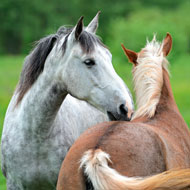More work needed to strengthen horse industry

Scotland's growing equine industry contributes £228 million to the economy each year.
More needs to be done to develop and strengthen Scotland's equine sector, according to a new report by Scotland's Rural College (SRUC) and the British Horse Society (BHS).
Authors called for a database to be developed, holding accurate information about the number and location of horses in Scotland.
It is felt this would improve disease monitoring, traceability of horses and more effective breeding programmes, whilst addressing the welfare concerns around increased numbers of horses.
The report provides a snapshot of the industry and makes recommendations to the Scottish Government, local authorities and the equine industry.
Scotland's growing equine industry contributes £228 million to the economy each year (not including racing). The industry is the UK's second biggest employer in the rural environment, however the report says progress is being hindered by a lack of co-ordination and support for businesses.
Helene Mauchlen, director of BHS Scotland said: "Nearly all legislation pertaining to the horse in Scotland is devolved. In order for our industry to compete fairly with other rural industries when it comes to recognition and funding opportunities we realised that we needed to start the ball rolling on collecting evidence on the value of the equine industry, instead of relying on figures extrapolated from the UK.
"This scoping report will hopefully point us in the right direction by identifying priorities for future work at the same time as providing a snapshot of where we are."
Read the full report here: www.sruc.ac.uk



 The veterinary mental health charity Vetlife is inviting the veterinary community to join it for a sponsored cold-water dip.
The veterinary mental health charity Vetlife is inviting the veterinary community to join it for a sponsored cold-water dip.